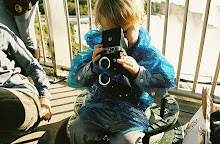 "black" by Min Song
"black" by Min SongDear Jonas,
Last Saturday, for a change, I didn’t have to go to work. Your Dad and I took you out for brunch in the early afternoon, which seems to be your favorite time of day for adventures. I wrapped you in all of your layers and carried you in the sling, and you waved to the air with your mittens and grunted when the wind got too invasive. We rode the train to Bedford, and then walked to the restaurant, and soon afterwards I pulled you onto my lap and gave you a bottle. While you were eating you stared at the photograph on the wall just at your eye level and the tin tiles on the ceiling. Afterwards you actually sat on my lap while I ate, which you have never done before. You are three months old this week. There were other babies in the restaurant, but you weren’t interested. You didn’t cry when they cried or give them a nod of baby recognition when they bounced by on a parent’s shoulder. You focused on the light fixtures, and their shadows, and the glass in the windows, and the decorative lace on the walls.
Later that night, just before you fell asleep, I left to go see your Auntie Beth’s dance performance. Beth came to the hospital when you were just one day old and held you, and we like to go and visit her when she’s at work, too. She’s pretty like Elizabeth Taylor. Maybe she’ll teach you about dancing some day. This weekend she had her first solo show at a place called The Kitchen, and it was called “what it looks like, what it feels like.” The performance didn’t start until 8pm, which is when you usually go to bed, so you stayed home with Daddy, but I wish you both could’ve come, too. The piece was a consideration of this word “like,” and whether or not it is possible. In the context of this title, “what it looks like, what it feels like,” like indicates a similarity or resemblance. In other words, the dancers’ movements are showing the audience how “it” looks and how “it” feels. Part of the challenge of interpreting the performance is to consider what “it” is intended to modify. “It” is a strange word that means nothing on its own—it is a way of referring back to something that has already been described; however, in the case of Beth’s performance, it is a non sequitur. We begin in the middle without a direct point of reference, and so we are left to imagine what it is that corresponds to what we see.
Or not. We might take a different route and understand the performance as a meditation on the impossibility of ever showing exactly what something is “like.” For the first portion of the performance, the dancers move across squares of mirrored glass, which fit together like a tic tac toe board. Two women almost double each other’s movements as they ignore and engage another woman moving alone in the center of the stage. Women crawl, sometimes slither, across the surface. Dancers come close, envelop each other’s bodies with rounded arms, one woman slumps onto the back of another, the woman underneath balances the other’s weight just slightly off the ground. The glass is somehow opaque and imperfectly reflective, creating the sensation that the mirrored foundation for the dancers’ confident movements could also, without warning, swallow them whole. Transparency is certainly on trial, and when each square is removed during the performance by groups of two—dancers and stage hands—each upturned mirror briefly reflects the audience as it is carried away, returning an image more like a funhouse distortion than a recognizable twin. At this point, the “it” itself is doubled. Audience and performer, self and other, are projected onto each other just as the dancers have at different points mimicked, but not mirrored, each other’s movements.
As the mirrors are carried offstage, the line between performers and spectators as well as the designation of any particular space as stage—reminding us that stage or no stage, we are always performing—is relaxed. During the next sequence, the shadows cast on the walls replace the reflections from the mirrors. In a series of stunningly complex variations, the dancers perform the same smooth gestures, each at slightly different times, enacting a continuum of variation within the restraint of a single move, offering yet another possibility of what it looks like to always, in some sense, be an other to one’s self. Using the body to make visible the complex workings of subjectivity, the limitations of self-knowledge are rigorously yet honestly conveyed. All of these different movements around a single “it” have taken the cohesive, self-same “I” and shown “it” to be an enterprise that is always already collective.
You, Jonas, are only three months old, but so many places and people have already contributed to what you will be “like.” You have a whole slew of aunties and uncles who will help you understand ideas like performance, me, you, self, and other. You are just now beginning to notice that when you wave your hands,when you circle your fingers around an object, you can make something happen. Hopefully this is an idea you will never tire of considering.



